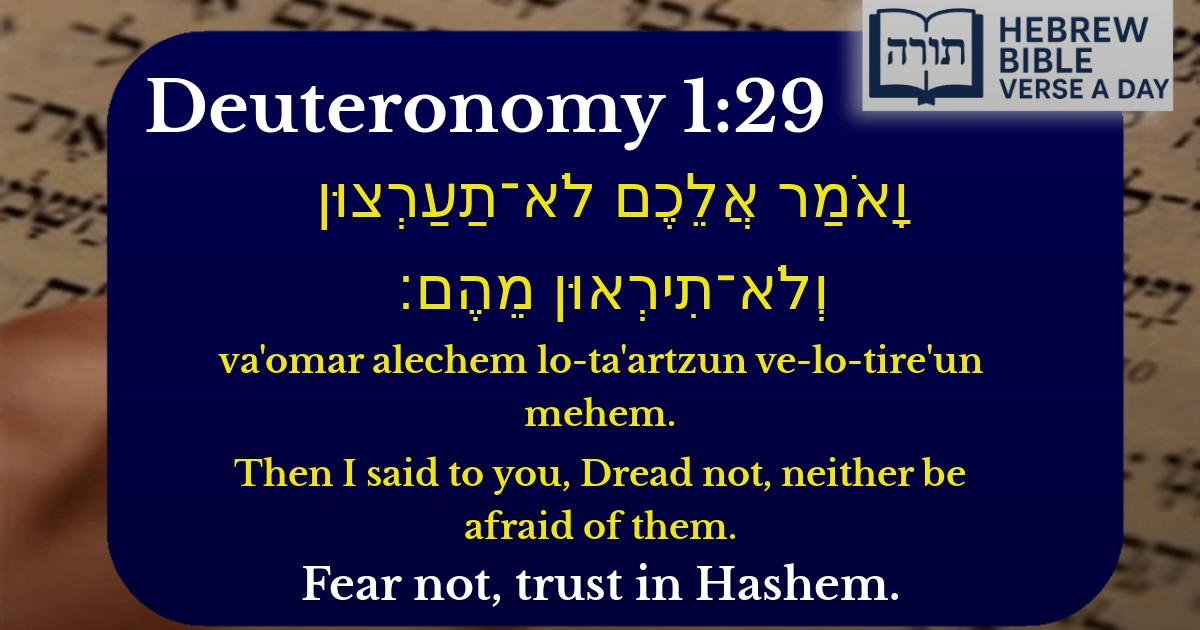Frequently Asked Questions
Q: What does 'Dread not, neither be afraid of them' mean in Deuteronomy 1:29?
A: This verse refers to Moshe (Moses) reassuring the Jewish people not to fear the inhabitants of Canaan when entering the Land of Israel. Rashi explains that 'Dread not' means not to be intimidated by their numbers, and 'neither be afraid of them' means not to fear their physical strength, as Hashem would fight for them.
Q: Why is this verse important in Jewish tradition?
A: This verse teaches the importance of bitachon (trust in Hashem) when facing challenges. The Midrash (Sifrei Devarim) emphasizes that fear of enemies stems from a lack of faith, and Moshe's words remind us that with Hashem's help, no obstacle is insurmountable.
Q: How can we apply 'Dread not, neither be afraid of them' in daily life?
A: The Rambam (Hilchot De'ot) teaches that one should face difficulties with courage and trust in Hashem. Whether dealing with personal struggles or communal challenges, this verse reminds us that fear should not paralyze us—instead, we should move forward with faith and determination.
Q: Who was Moshe speaking to in this verse?
A: Moshe was addressing the generation of Jews who were about to enter Eretz Yisrael (the Land of Israel) after the Exodus from Egypt. According to the Talmud (Sotah 35a), this was a reminder to the people not to repeat the mistake of the spies, who allowed fear to overcome their trust in Hashem.
Q: What is the difference between 'dread' and 'fear' in this verse?
A: Rashi explains that 'dread' (תַעַרְצוּן) refers to anxiety about the enemy's large numbers, while 'fear' (תִירְאוּן) refers to being intimidated by their physical power. The Torah uses both terms to emphasize that no aspect of the enemy should cause panic when Hashem is with us.


Context of the Verse
The verse (Devarim 1:29) appears in Moshe's recounting of the events at the time of the spies, when Bnei Yisrael were commanded to enter Eretz Yisrael but expressed fear of the inhabitants. Moshe reminds them of Hashem's assurance that they need not fear the nations dwelling in the land.
Rashi's Explanation
Rashi (Devarim 1:29) explains that the phrase "לֹא־תַעַרְצוּן" (do not dread) refers to not being intimidated by the sheer numbers of the enemy, while "וְלֹא־תִירְאוּן מֵהֶם" (do not fear them) means not to fear their military strength. Rashi emphasizes that this was a divine reassurance that Hashem would fight for them.
Rambam's Perspective
Rambam (Hilchot Melachim 7:15) discusses the broader principle of bitachon (trust in Hashem) in warfare. He teaches that when Israel goes to battle with proper faith and trust in Hashem, they need not fear the enemy, as victory is assured if they uphold the mitzvot. This verse serves as a foundational example of this principle.
Midrashic Insights
Practical Lessons
The verse teaches that fear of human adversaries is misplaced when one has faith in Hashem's protection. This applies not only to physical battles but to all challenges in life. The Chofetz Chaim (in Ahavat Chesed) notes that this principle extends to personal struggles, where trust in Hashem dispels unnecessary anxieties.